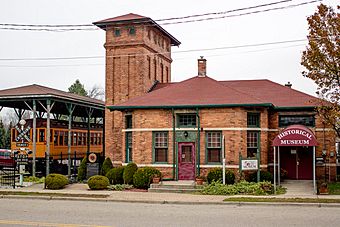Coopersville station facts for kids
|
Grand Rapids, Grand Haven and Muskegon Railway Depot
|
|
 |
|
| Location | 363 W. Main St, Coopersville, Michigan |
|---|---|
| Built | 1902 |
| NRHP reference No. | 73002294 |
Quick facts for kids Significant dates |
|
| Added to NRHP | February 6, 1973 |
The Coopersville Station is a really old railway station in Coopersville, Michigan. It was first known as the Grand Rapids, Grand Haven and Muskegon Railway Depot. This historic building once served electric trains that carried people and goods. Today, the Coopersville Area Historical Society and Museum uses the station to share local history.
Contents
The Story of Coopersville Station
Building an Electric Railway
The Grand Rapids, Grand Haven and Muskegon Railway company started in 1899. They built a 44-mile-long electric train line. This line connected cities like Grand Rapids, Grand Haven, and Muskegon. The Coopersville Station was built in 1902, just when the train service began.
More Than Just a Stop
This station was special because it did more than just let passengers on and off. It was also an electric substation. This means it helped power the trains! It changed electricity from one type (AC) to another (DC). This DC power then went to the trains through a special "third rail" on the tracks.
Changes Over Time
In 1912, another company, United Light and Railway Company, bought the railway. They ran the trains until 1928. The original railway company only had permission to use the land, not own it completely. So, when United Light stopped operating, the property went back to the city of Coopersville.
For many years, starting in the 1930s, a local garden club used the building. Later, the Coopersville Public School System used it for a special education program.
A Museum Today
In 1987, the Coopersville Area Historical Society took over the building. They worked hard to fix it up, finishing the renovations in 1991. Now, the old station is a museum. It helps people learn about the history of Coopersville and the trains that once ran through it.
What the Station Looks Like
The Coopersville Station is a one-story building made of red brick. It has a cool attached tower and a red clay tile roof. Inside, it had a waiting room for passengers and space for shipping freight.
The tower was where all the electrical equipment was kept. Cables connected this machinery to the railway power lines. You can still see the openings on the tower where these cables once passed through! It's a neat reminder of its electric past.



